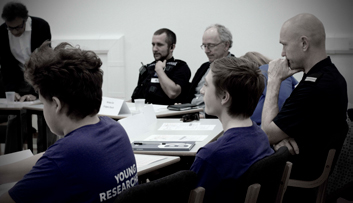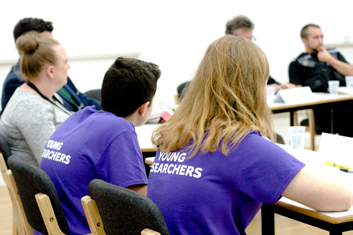7.1 Community
This chapter reports on three research events each reflecting a different approach to engaging the wider Whitley community with a focus on aspiration and as a context for understanding the relationships between family and school. The ‘community’ is perceived here as a geographical entity, largely residential and served by a range of agencies and institutions – some statutory such as schools and health services and others of a voluntary or community group character.
Older notions of community reflect a settled and distinct neighbourhood where people knew each other for much of their lives. However:
“People’s sense of identity used to be embedded in the community to which they belonged, in people’s real knowledge of each other but now it is cast adrift in the anonymity of mass society”
(Wilkinson and Pickett, 2009).
There are seven primary and two secondary schools in Whitley – described as a partnership in the Whitley Excellent Cluster (WEC). Approximately 1,100 students (June 2018) in total attend the two secondary schools. Reference has already been made to levels of attainment and academic ‘success’ in Chapter 1, including the well- researched link between pupil attainment and inequality. Feeling threatened, stressed or helpless directly impacts the capacity to learn.
As Wilkinson and Pickett1 go on to say:
“Another way in which inequality directly affects educational achievement is through its impact on the aspirations, norms and values of people who find themselves lower down the social hierarchy” (p 115)

The Whitley Big Local Community Plan (2012 – 2022) written by Whitley residents, who are vexed about the way in which their community is portrayed e.g. it’s ‘crime addled’ ‘falling further behind’ ‘benefit dependant’ with a ‘very high concentration of single parents’ (pages 9 and 10). They go on to say it is not surprising that people in Whitley suffer from ‘.. low expectations within ourselves’ (p10).
Residents have been ‘talked down to’ and disabled by those authorities who ‘know best’ for long enough with the result that residents:
“.. (think) they aren’t capable ... so they expect others to do things for them when in practice they could and should be making changes for themselves and their community and friends” (p10).
What these quotes and comments illustrate is a set of tense relationships first of all between Whitley residents – those who are discouraged and disengaged and those who are activist and working at community betterment. Secondly, the links between residents and serving agencies or institutions who may be seen by residents as patronising and/or dismissive of local capabilities. Thirdly, is the view from inside the schools of the community they serve and the families whose children they educate.
“To a degree, working class people resist the imposition of education and middle class values, because becoming educated would require them to give up ways of being that they value”2.
Compounding the challenges associated with attempts to bridge differences of expectation and experience between community, families and schools is the impact of deprivation and inequality which tends to fracture bonds and undermine potential ties. Here structural forces such as social class, gender and ethnicity shape aspiration and influence the relationships between home, school and community.
Our first report on transport and mobility3 suggests that many residents in Whitley have little experience of making connections outside of their own area. This lack of experience and connections can also contribute to a lack of confidence since the unknown is hard to deal with. This may also contribute to the evident friction (referred to in Chapters 5 and 6) between some parents and school staff.
All of the above provided a thought-provoking context for our three community exercises.
1Wilkinson, R. and Pickett, K (2009) The spirit level: why equal societies must always do better London and New York: Allen Lane
2Evans, G. (2008) Educational failure and working class white children in Britain. Palgrave Macmillan: Basingstoke, p115.
3Lloyd-Evans et al (2015) Working better with Whitley: exploring the everyday transport needs and experiences of local communities in South Reading. University of Reading and Whitley Big Local. Available from http://localtrust.org.uk/assets/ images/uploads/Whitley_Report_25.09.2015_FINAL_VERSION.pdf
7.2 Researching with Communities
Stakeholder Interviews: Our first formal community research project was conducted in June and July 2017 when two University of Reading interns (Bethany Brown and Hayley Ryall) interviewed nine representatives of Whitley stakeholder agencies and policy makers1.
The interviews aimed to gain insight into stakeholder perceptions of issues in Whitley and find out what information they wanted to get from the Decent Neighbourhood Fund research to inform future delivery and further engagement with the community. A great deal of preparation went into the planning for the interviews with care and consideration given to the questions to be asked and the methodology for conducting interviews and also the most appropriate agencies to be approached.
This was a highly productive project that generated a rich data haul in issues identified and key recommendations. In tackling deprivation it was suggested, for example, that communications between organisations be improved, schools helped to create incentives for parents to be more actively involved, working for increased community engagement and tackling stigma in and around Whitley.
Some of the key recommendations addressed increasing engagement between secondary schools and parents, improving careers advice for both students and parents, promoting a stronger sense of community, ensuring that
Whitley is not by-passed by job opportunities and understanding that higher education is not necessarily a sign of ‘high aspiration’ there are alternatives such as apprenticeships.
Young Researchers’ Community Panel: Our second research exercise was a community panel held on the 25th April 2018. This was hosted by JMA and involved a panel of ten residents and agency representatives2 who were invited to respond to questions devised entirely by the JMA Young Researchers. They wanted to explore what panel members felt about how the Whitley community supports the hopes and aspirations of its young people. An audience of other community members was also encouraged to participate.
The Young Researchers – by now recognisably a team in their self- designed T-shirts, badge and logo – spent some time debating and deciding what questions should be posed to the panel. Considerable attention was also paid to the format of the panel – location in the school, seating arrangements, recording, the agenda and chairing arrangements. There was a realisation that the tone of the session should emphasise a constructive approach with some expectation that the panel members and young people together identify some feasible steps that help bring school and community closer together.
One conclusion was that there is always a way forward from any starting point – further findings included:
- Good for us,’ is a more valuable aspiration to the community than ‘good for me.’
- Supportive relationships are key to developing such aspirations. Parents, teachers and others in the community who genuinely put something into the lives of young people inspire them to give something back.
- Respect, engagement and responsibility cuts both ways in the relationship between young people and adults.
- Addressing stigma involves changing the way that each of us talks about Whitley – there was still evidence of stigma in the room.
- Getting community groups and young people together generated a real sense of goodwill and common purpose. Developing positive lines of communication in this way helps to reduce the negative commentary.
- Celebrating and learning from local role models highlights positive pathways forwards.
- Extra-curricular activities that provide hands-on learning experience also reveals pathways forwards.
- Accessibility to extra-curricular activities in Whitley is increased if they are local, free, and promoted via the school. Collaboration with schools would help with targeting the young people who might benefit the most.
In effect here, there is a plea to create together a community aspiration – one that reflects a shared hope for individuals and groups for the future of Whitley. It’s a big umbrella under which the community widely can agree on common values. It may be worth, therefore, compiling together a ‘charter’ of characteristics for a strong aspirational community.
One further element deserves notice and that is the achievement of the Young Researchers in taking on a formidable challenge for any young person – taking on, in most cases, professional providers and querying in public their commitment to better serving young people. The voice of young people is not often heard in such forums. The panel event could model a new and exciting outlet for the youth voice while building their confidence, their empowerment and a sense of agency.
Partner Meeting and Celebration Event: Our third research event was a partner meeting held on the 16th May 2018. The Whitley for Real partnership led this collaborative session to consider the latest research findings with a focus on generating firm conclusions as a basis for action planning. The event brought diverse players into one room for a common purpose, helping to form the relational network through which change can take place. Members of Whitley’s less well heard social groups were able to voice their points of view.
One preamble for the event stressed the importance of words and building a vocabulary – a vocabulary as a means to carry the research forward as a launch pad for action.
“With this understanding we are using words not as bullets or missiles but seeds – seeds are beginnings and everything begins with a word”.
For the Young Researchers their words underscored the importance of turning dreams to goals and being steadfast about future ambitions and speaking out ‘We must be heard’. The Young Researchers came across as dynamic and positive about the process of going forward that they had begun.
For the Whitley Researchers their words stressed personal growth and development gained through research that also helped in building relationships, being sociable and being listened to.
Other mixed workshop sessions promoted the importance of a local culture of respect and support – key words here were trust, listening, communication, confidence and relationships across the community whether residents or workers. Being aware of opportunities and harnessing them for achieving or advancing aspiration was essential.
To conclude the session a panel of six local representatives – including Reading Borough Council, New Directions and Reading UKCIC and two residents, responded to the workshop’s conclusions as a basis for action planning.

1Brown, B. and Ryall, H. (2017) ‘Investigating barriers and opportunities in Whitley from the perspective of key community stakeholders as part of the Whitley for Real project 2017’, University of Reading
2Representatives of the panel included local police and fire services, RBC, Affinity Housing and the event was Chaired by Charlie Clare from Aspire 2
7.3 Conclusions
What the three community research events offer is a broader movement for change across the community without internal segregations – where various organisations, groups and individuals can align their efforts to help achieve an aspiring community. We will return to this in our concluding chapter.
BOX 7.1 WIDER COMMUNITY – SUMMARY OF FINDINGS
Pathways to a brighter future (such as higher education, training, life skills, the right attitude and the right job fit) are imperfectly understood. This could be addressed by:
- Establishing better links between parents and secondary school staff.
- Celebrating and learning from local role models.
- Developing supportive relationships with young people. Parents, teachers and others in the community who genuinely put something into the lives of young people inspire them to give something back. ‘Good for us,’ is a more valuable aspiration to the community than ‘good for me.’
- Providing extra-curricular activities with hands-on learning experience. Accessibility to extra-curricular activities in Whitley is increased if they are local, free, and promoted via the school. Collaboration with schools would help with targeting the young people who might benefit the most.
Respect, engagement and responsibility cuts both ways in the relationship between young people and adults.
Getting community groups and young people together generated a real sense of goodwill and common purpose. Developing positive lines of communication in this way helps to form the relational networks through which change can take place. Positive and direct communication is important in counteracting stigma and negative commentary.

